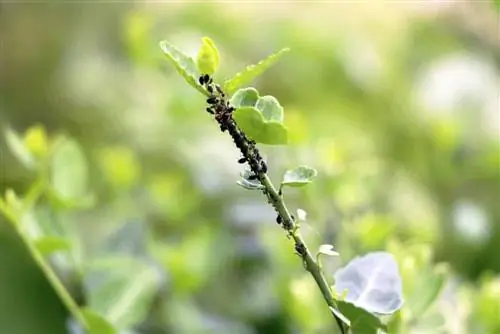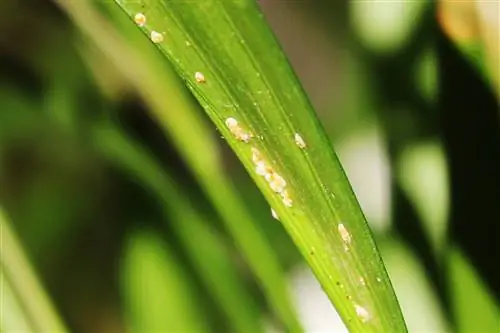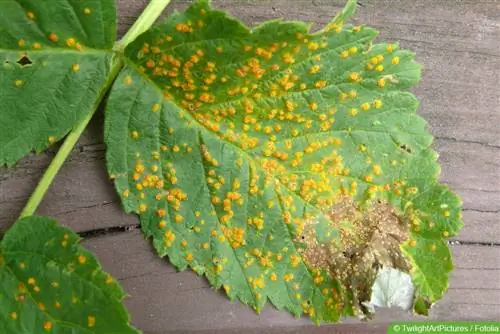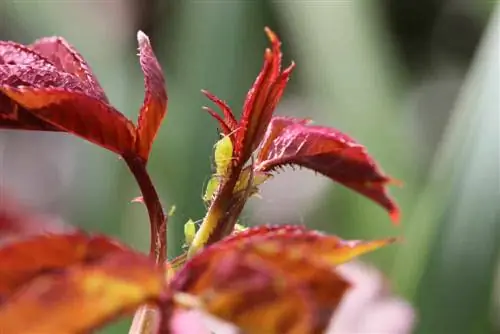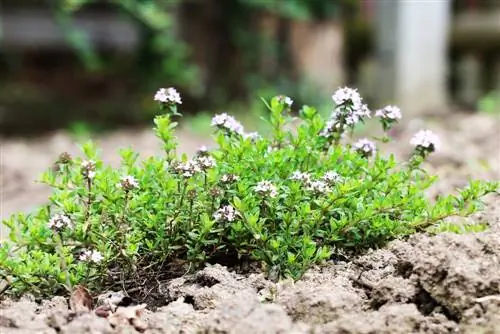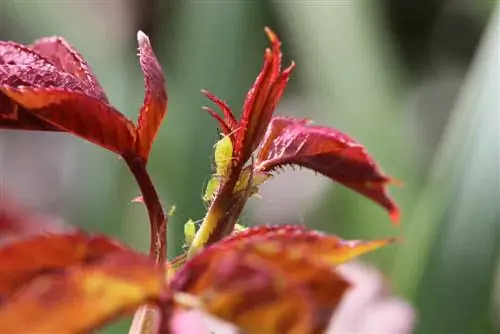- Author admin [email protected].
- Public 2023-12-17 03:39.
- Last modified 2025-01-24 12:45.
Aphids are widespread plant pests and do not stop at herbs. Within a short time, the small insects can grow into large colonies and damage the tender leaves and young shoots. In addition, aphids can often transmit dangerous pathogens when sucking. Therefore, countermeasures must be taken promptly. Natural treatment methods without harmful chemicals are perfect for both human he alth and the environment.
Stinging nettle broth
A decoction of nettles is a biological home remedy that has been used successfully to combat aphids for a long time. To make a decoction, both fresh and dry leaves can be used. The cold extract of nettles, sprayed pure, helps against normal to moderate infestations. Ideally, the mixture can then steep well after preparation, but it should not ferment. The fermentation process begins quickly, especially during the summer months, during which time the brew should be placed in the refrigerator. The broth can develop an unpleasant smell, which can be alleviated with a handful of rock dust.
- Requires 200 grams of fresh leaves
- Alternatively use 20 grams of dried nettles
- Roughly chop the nettles
- Soak in 1 liter of water for two days
- Then strain out all plant parts
- Pour undiluted brew into spray bottle
- Spray lice on leaves and stems with it
- Repeat more often if necessary
Tip:
If the mixture has started to ferment, it can be used as fertilizer for the herbs and strengthens their immune system to prevent aphid infestation.
Cord and soft soap
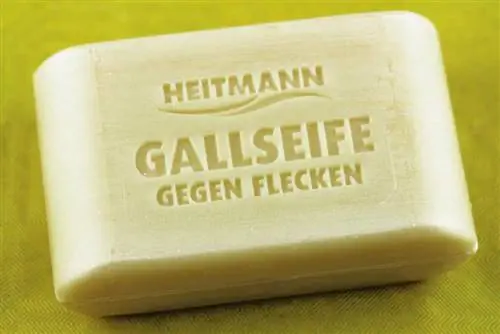
Curd and soft soap is a widespread home remedy in the fight against aphids. Since the soap does not contain excess fat, there is no greasy film left on the sensitive herbs after use. In addition, these natural soap products do not contain any fragrances or dyes, and no artificial thickeners are used. Liquid soaps and natural soaps are not suitable as antidotes because they contain fragrances and other ingredients. This would deteriorate the flavor of the herbs. If the aphid infestation is very severe, the effectiveness of the soap solution can be intensified with a little alcohol.
- Curd and soft soap in organic quality is ideal
- Cut about 25-50 grams from the soap bar
- Amount depends on the number of infested herbs
- Rubbing soap afterwards
- Then dissolve in 0.5-1 liter of warm water
- After cooling, fill soap solution into spray bottle
- Spray affected herbs, but not the soil
- Wash off the soap solution well before consumption
Garlic stock
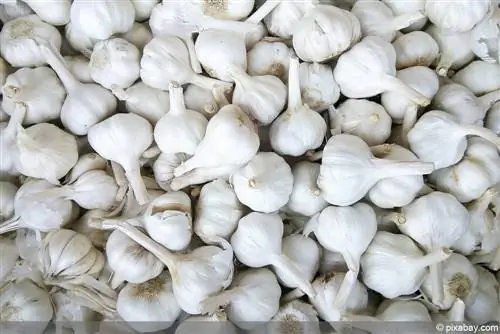
Aphids can also be effectively controlled with garlic. As a spice, garlic is a real all-rounder; thanks to its strong smell and essential oils, it is also effective against pest infestation. The garlic broth can be made quickly and also helps with problems with maggots, mites, caterpillars and snails. This mixture has also proven to be helpful against various fungal diseases. Although the smell is very strong, it goes well with most spicy herbs.
- You need 50 g of fresh garlic
- Chop the garlic cloves finely
- Then pour 1.5 liters of boiling water over it
- Then let it steep for at least three hours
- Then strain through a tea towel
- Pour cold brew into spray bottle
- Spray affected herbs with undiluted broth
- Then repeat every ten days as a preventive measure
Manure from field horsetail
Field horsetail has been used to combat pests in the garden for many generations. The herb not only deters the aphids, but also strengthens the herbs' immune system as a preventive measure. In this way, the plants can better withstand an infestation. However, the decoction made from field horsetails only works in the initial stages of an aphid infestation. If this is very advanced, stronger antidotes are needed.
- Ideal is 1 kilogram of fresh field horsetail
- Alternatively use 200 grams of dried herb
- Soak in two liters of cold water for 24 hours
- Then pour into spray bottle
- Spray the herbs several times
- Use thereafter weekly as a preventive measure
Neem oil
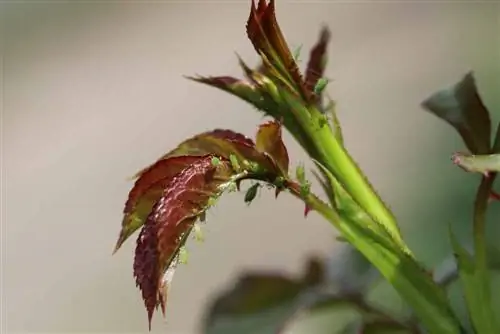
Neem oil comes from Asia and is deeply rooted in Ayurvedic healing. The helpful oil is sold in he alth food stores and he alth food stores. Since neem oil has a very strong effect and also smells, it should never be used undiluted. Otherwise the herbs could be damaged. Due to the intensive effect, the aphids are no longer active just a few hours after the first application. After a few more applications, the pests disappear completely.
- Mix 1 teaspoon of neem oil with 1 liter of water
- Pour liquid into spray bottle, shake well
- Spray affected parts of the plant once a day
- If the infestation is severe, carry out several times a day
- Then use preventatively every 10 days
Broth from bracken
An effective spray against aphids can also be made from the leaves of the bracken fern. It is effective against all types of lice and can also be used for herbs that thrive in indoor cultivation. Since this broth is very high in potassium, it strengthens the immune system of the herbs just like a fertilizer.
- 100 g fresh bracken fern leaves
- Roughly chop fern leaves
- Put into saucepan with 0.5 liters of water
- Cover and simmer at low temperature for 1 hour
- After cooling, strain the plant parts through a cloth
- Dilute the broth with an equal amount of water
- Spray the affected parts of the plant
Oregano brew
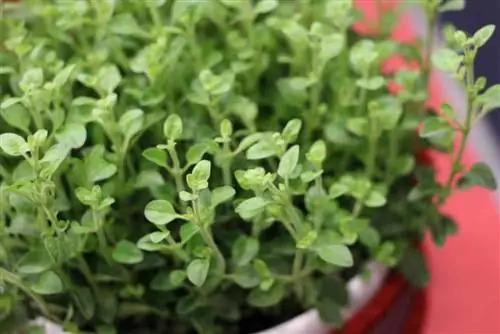
Oregano is a popular culinary herb and is not only good for cooking. The herb contains many essential oils and other substances that repel aphids. Since oregano is already available in most households, the spray can be made quickly and easily.
- It takes 100 grams of fresh oregano
- Alternatively use 10 grams of dried oregano
- Pour 0.5 liters of boiling water over the leaves
- Let the brew steep for 15 to 20 minutes
- Then sieve out all plant residues
- Then dilute the broth with water in a ratio of 3:1
- Let cool, then pour into spray bottle
- Use daily against pests
Soda
Baking soda is a universal home remedy and can be used in many ways. In the garden it also works against aphid infestations. The product is completely harmless to both people and nature. Depending on the dosage and other ingredients, the antidote can be adjusted to the severity of the infestation. Then it even helps against stubborn bloodworms, scale insects and mealybugs.
- Dissolve 1 teaspoon of baking soda in 1 liter of water
- In case of severe infestation, add oil
- Alternatively, adding alcohol is also possible
Broth of ivy
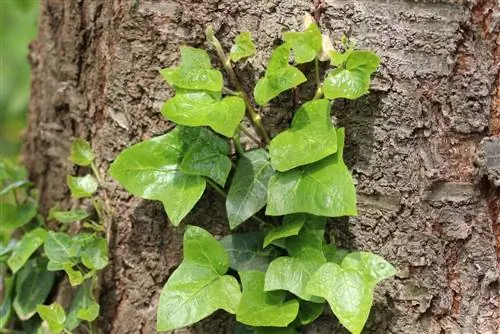
Ivy contains saponins, which are soap-like ingredients. These natural substances are found in various plants and can also be used as an effective home remedy against lice infestation.
- Collect about 40-45 ivy leaves
- Roughly chop ivy
- Put in pot with 1 liter of water
- Then cover and simmer for 30 minutes
- Mixture should not foam over
- Afterwards let the broth cool down
- Strain through tea towel
- Then fill into spray bottle
- Spray infected herbs daily
- Repeat several times a day for stubborn infestations
Tip:
Since chestnuts also contain saponins, this spray can also be made from them. However, the gardener has to wait until autumn, when the chestnuts begin to ripen.
Natural predators
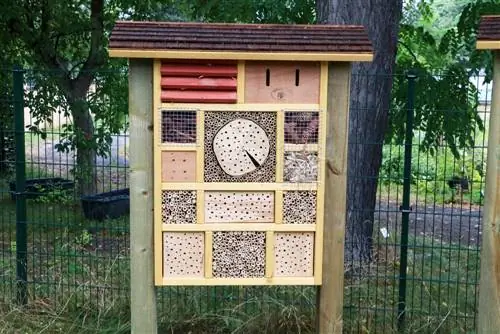
Aphids can also be controlled with the help of natural predators. These welcome beneficial insects are extremely effective and can kill 400 to 500 aphids per day. In addition, the gardener's workload is kept within clear limits. Once the predators are settled, everything takes care of itself.
- Natural predators are ladybird larvae
- Larvae of lacewings and gall midges are also helpful
- Earwigs and parasitic wasps are also included
- Can be attracted by nesting boxes and insect hotels
- These devices are easy to build yourself

